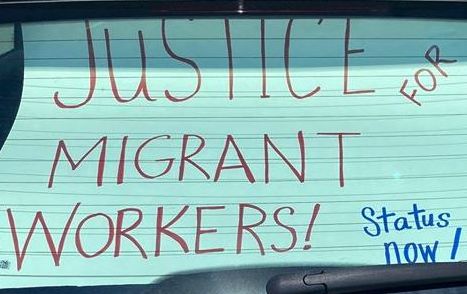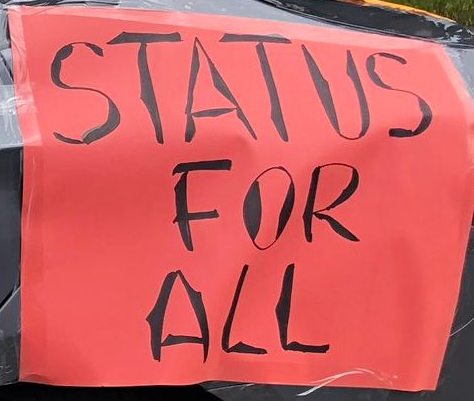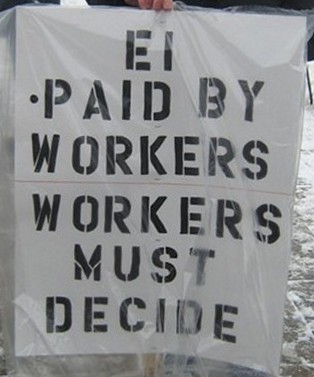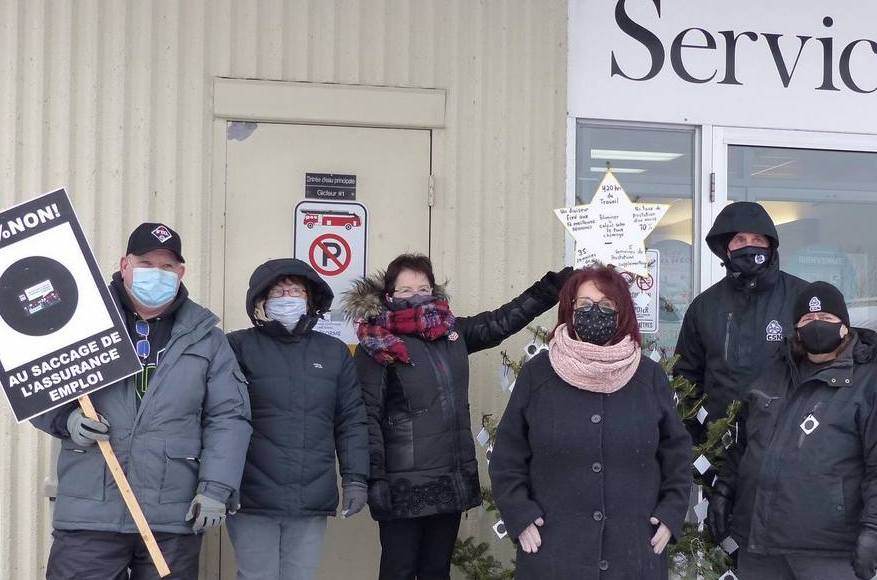December 17, 2020 -
No. 85
Migrant
Farm Workers from Trinidad and Tobago
Stranded in Canada
Charge
the Federal Government for Abuse in its Treatment of Migrant Workers!  
Quebec and New Brunswick
Actions Demand Thorough Reform of
Employment Insurance
• All Out to
Defend the Unemployed!
•
Spokespersons of Defence
Organizations of the Unemployed Speak Out
Federal
Government Operation of Pacific Gateway Hotel
• Hotel Workers Demand
Guaranteed Recall to Their Jobs
Migrant
Farm Workers from Trinidad and Tobago Stranded in Canada

Several hundred migrant farm workers are stranded in Canada because
of a ban, due to the pandemic, on travel to Trinidad and Tobago. These
are workers who came to Canada this year under the Seasonal
Agricultural Worker Program (SAWP), along with workers from Mexico and
other Caribbean countries. Normally when their work on
Canadian farms ends migrant farm workers return to their home
countries, many coming back to Canada year after year. This year most
workers returned home at the end of the season but the workers from
Trinidad and Tobago have not been able to. The
situation these migrant workers found themselves in was not only
untenable
but an outright violation of human persons. The federal government
should be charged with abuse and give compensation for what these
workers have suffered. These workers are forced to pay EI premiums when
working but they are not entitled to receive EI benefits. This
is because one of the conditions for EI is that a worker be willing and
able to work and, under the SAWP program, a worker is tied to one
employer and therefore prohibited from working for any other. This
means that they are here without any income at all. Furthermore,
because they came to Canada prepared to return to their families at the
end
of the season, they now have no winter clothing and have been forced to
live in inadequate accommodation, including their employers'
bunkhouses, some of which are not winterized. They have been without
income, without winter clothing, without adequate accommodation and, in
addition, they have had to cover expenses for food and, in some
cases, rent and/or utilities -- all in below zero temperatures.
Workers' Forum firmly condemns the
Canadian government for
permitting this situation. The treatment these workers have been forced
to suffer is outright abuse of human persons. Migrant
worker advocates have been helping out with food and
clothing. They have been demanding immediate action to ensure that all
these workers' needs are met while they remain in Canada, including
income support, health care, proper food, clothing and accommodation.
Their appeal to the government demands it provide EI benefits,
training and an end to the restrictions that prevent the stranded
workers from working for other employers. They are also repeating the
demand to resolve the problems that have existed for as long as the
SAWP has existed and which were made far worse this year because of the
pandemic. Migrant workers must be provided with all benefits to
which Canadian workers are entitled under the law, open work permits
and permanent status in Canada.  It
is now reported that on December 16, Immigration, Refugees and
Citizenship Canada issued a temporary public policy which will allow
the workers from Trinidad and Tobago to apply for temporary status and
get a 6-month open work permit, according to a government statement.
The statement says: "Under the policy, which will be in
effect until February 12, 2021, workers will be able to apply for
temporary status and get a 6-month open work permit. This should allow
them to find other employment and apply for any other government
support they may be entitled to, such as employment insurance. This
action is part of a broader effort to support the needs of these
workers,
including emergency accommodation." It
is now reported that on December 16, Immigration, Refugees and
Citizenship Canada issued a temporary public policy which will allow
the workers from Trinidad and Tobago to apply for temporary status and
get a 6-month open work permit, according to a government statement.
The statement says: "Under the policy, which will be in
effect until February 12, 2021, workers will be able to apply for
temporary status and get a 6-month open work permit. This should allow
them to find other employment and apply for any other government
support they may be entitled to, such as employment insurance. This
action is part of a broader effort to support the needs of these
workers,
including emergency accommodation."
Justice for
Migrant Workers issued a statement on December 17,
stating: "For decades, migrant farm workers have been demanding change
and substantial reforms to Canada's temporary foreign worker program
(TFWP). The federal response is a direct result of the organizing by
workers and advocates to address an archaic and outdated
migration scheme that resulted in the crisis that the workers from
Trinidad and Tobago are put in. It is imperative to offer
support and the full range of benefits and freedoms to those who are
being forced to stay in Canada and that steps are taken immediately to
assist migrants who desire to return home." Justice
for Migrant Workers again called on the government to extend
the policy to all migrant workers employed in Canada, provide open work
permits for all migrants immediately and implements a system where all
migrants have permanent status on arrival. The full statement
can be found here.
Justice for Migrant Workers is calling on everyone to join a
letter-writing campaign addressed to the Ministers of Families,
Children and Social Development, Immigration, Refugees &
Citizenship, and Employment, Workforce Development and Disability
Inclusion -- Ahmed Hussen, Marco Mendicino and Carla Qualtrough
respectively. For a
template which people can fill in to send a letter to the three
ministers and to their local MP, click here.
The letter states: We call on the Government of
Canada to do the following: 1. Reverse all
decisions denying regular EI benefits to migrant farm
workers, that were made on the basis that they were unavailable to work
because of their work permit status. Award EI benefits to all workers
who have applied immediately; 2. Remove the
conditions predicating access to regular EI benefits
on their work permit and their physically being in Canada. Provide
equal access to the regular EI benefits for migrant workers, after they
go back to their countries, through the development of interstate
agreements between the governments of Canada and sending countries.
This
access can be modelled on similar agreements that already exist with
the United States and inter-state agreements globally; 3.
Restore migrant workers' access to special EI entitlements including
parental, maternity and compassionate benefits; 4.
Provide migrant workers with access to training and education and
all social and income benefits in Canada and when they are back in
their home countries; 5. Waive all fees for
applications for work permits for farm work; 6.
Provide all workers arriving in Canada under SAWP or the
Agricultural Streams with open work permits that are not dependent on
LMIAs; 7. Provide them with permanent residence
status on arrival.

Quebec and
New Brunswick Actions Demand
Thorough Reform of Employment
Insurance
 
From December 7 to December 11, actions were held across
Quebec and in New Brunswick to demand a thorough reform of Employment
Insurance (EI) to uphold the rights and dignity of unemployed workers.
Actions in Quebec were held as part of the campaign "We Must Improve
our Situation. Unemployment insurance reform is
needed!" of the Autonomous Movement in Solidarity
with the Unemployed (MASSE). The New Brunswick action was organized by
Assistance and Support for Workers in Seasonal Sectors (ASTS) which is
active mainly on the Acadian Peninsula in Northern New Brunswick.
Actions were held by defence organizations of the unemployed with the
support of
trade unions. They involved only some activists of the organizations in
order to adhere to health and safety protocols related to the pandemic.
The
actions were part of the long-standing struggle for an EI regime that
upholds the rights and dignity of all unemployed workers. It
highlighted the fact that millions of workers who lost their jobs
during the pandemic could only survive because of emergency temporary
benefits that were created by the federal government. This
shows
that
the EI regime does not protect the unemployed. Today, only 40 per cent
of the unemployed are eligible to receive EI benefits and those
benefits do not cover their basic needs. Furthermore, they do
not
last long enough to guarantee that unemployed workers will not face
periods in which they have no income at all between jobs. Unemployed
refer to this period without any income whatsoever as "the black hole."
It refers to the gap between when a seasonal worker's EI
benefits
run out and when the worker's job starts up again. The black hole has a
huge impact on seasonal workers who run out of benefits, if they
qualify for benefits in the first place.
The organizers of the actions put forward three main demands:
a universal qualifying period of 350 hours or 13 weeks worked; a
benefit rate of at least 70 per cent of the previous wage based on the
12 best weeks; a minimum of 35 weeks of benefits. This would eliminate
the different qualifying periods and duration of benefits
established
arbitrarily in different regions of the country on the basis of the
official rate of unemployment in the region. The aim is to increase
overall eligibility for EI, with special attention to part-time
workers, to guarantee unemployed workers a liveable income for as
long as they are unemployed, and to eliminate phenomena such as the
black hole. Workers'
Forum firmly
supports the demands of the unemployed workers and calls on all
Canadians to defend the dignity of labour by joining them. They reflect the
increased consciousness, which the pandemic has
highlighted in a dramatic way, of the need for profound changes that
favour the people and protect them from the crises that are
erupting. The demand for EI reform is
part and parcel of workers' fight for social programs that defend the
well-being of all and are under the control of the people.
Workers' Forum
also congratulates and
greets all the activists who face a heavy burden of work to make
sure that the unemployed are not left to fend for themselves because
the ruling elite and its system has wrecked the EI program and has
rendered the society unable to face crises. 
 
Workers' Forum is publishing below the
remarks of leaders of three of the actions calling for Employment
Insurance (EI) reform it interviewed about the work of their
organizations. France
Simard, Mouvement Action Chômage Lac-Saint-Jean
The pandemic has forcefully highlighted the profound flaws of
an outdated law that does not reflect the reality of 21st century work
and deprives a very large number of unemployed people of EI
benefits to which they should be entitled. There needs to be an
in-depth reform of EI and we need to be consulted; we
don't want them to do it on their own. We want to sit at the same
table, because we see the shortcomings on the ground, we have the
experience on the ground on our side. We want a just and universal
employment insurance system for all citizens of Canada. We held a press
briefing on December 7 where we presented the campaign's
demands, with the support of the Confederation of National Trade Unions
(CSN) and the Quebec Federation of Labour (FTQ) who joined their voices
with ours.

December
7, 2020. France Simard speaks at press conference in Chicoutimi. |
As
far as the pandemic is concerned, it has brought its share of extra
work. We have all had an appalling overload of work. There were a lot
of program changes, especially at the beginning. Everyone acted in good
faith but it was a shaky start. Service Canada closed its doors for a
while. Now they offer their services but in a very limited way
so everybody is turning to us. We had a big increase in the number of
people we had to assist. We had to answer questions from just about
everybody. We had to learn the programs very quickly. Once the Canada
Emergency Response Benefit (CERB) was in place, things calmed down. We
provided a lot more one-on-one help than usual. That's
not usually our main work. We are funded to do collective defence but
since March our focus has been on assisting individuals. We have
managed to get through it and respond to everyone. No one wanted to go
through a crisis like this, but it's here and we have to deal with it.
We were able to rise to the challenge. I am proud of my team, a small
but strong team. We can see that the work we've done for all these
years was not for nothing. Fernand Thibodeau,
Assistance and Support for Workers in
Seasonal Sectors
(Northern New Brunswick)
On
December 7, we went to place Christmas trees in front of
the employment centre office with black bells to illustrate the black
hole problem. The situation of our people has improved a little bit
with the federal government's emergency programs but we must not
forget that the problems of employment insurance are not solved,
including, among others, the problem of the black hole. In the region
where we are active, the Acadian Peninsula, Baie-Sainte-Anne,
Pointe-Sapin, etc., between 60 and 70 per cent of people work in
seasonal industries such as fishing, fish plants, peat, forestry,
and tourism. 
Fernand
Thibodeau, Spokesperson of ASTS |
One
problem we have is that the EI offices have reopened, but they are
limited in their
services. They assign you an agent who calls you back within 24 to 48
hours. Very often when people who need to apply for EI try to open
their file on the internet, they can't open it, or it says that their
file has expired. Many don't get
their Record of Employment from their employer. They come to us for
help to apply for EI. There are people who are illiterate, who have
learning disabilities, and there is a lot of fear of making mistakes in
their application because employment insurance is extremely
judicialized. I myself have completed about 400 employment insurance
claims
for people. I have to do this at home because our committee does not
receive funding from the provincial government. We are all volunteers.
We also help people on other issues, such as ensuring that seniors get
what they are eligible for at the provincial level with regard to
COVID-19, helping people renew their licence plates, among other
things.
I can honestly say that this year if the ASTS committee hadn't been
there for people it would have been a nightmare. Also,
the pandemic has shed light on what we have said for several years,
that the EI program is outdated. We want the government to work with us
to carry out a complete reform of EI. Line
Sirois, Action-Chômage Côte-Nord
On December 7, we held a press briefing in front of the
Service Canada offices in Forestville. We did what we have always done,
we brought a Christmas tree decorated with black holes. We were with
the CSN. We summoned the media, and we asked that the measures that the
Trudeau government put in place temporarily for the pandemic
become permanent measures. In this temporary reform, the Trudeau
government set the number of hours of work required to qualify for
employment insurance at 420 hours. We don't want to go back to
requirements of up to 700 hours of work to qualify as is happening in
our region. The government has said that it must consult before
reforming
EI. Yes, everyone must be consulted, but in the meantime the temporary
measures put in place because of the pandemic must become permanent
measures. We want in-depth reform, and we don't want it to end up as an
election promise. 
December
7, 2020. Action in Forestville.
Line
Sirois is fourth from the left. |
At
the moment the
unemployment
rate is going down. We have told reporters that no matter whether the
unemployment rate goes down or up, the hours of work for our people who
depend for their living on seasonal work will not change. The lower the
official unemployment rate, the more hours a worker has to work to
qualify and the fewer
weeks of benefits they are entitled to. Conversely, the higher the
unemployment rate, the fewer hours a worker has to work to qualify and
the more weeks of benefits a worker is entitled to receive. We want
this to stop. We want to eliminate the unemployment rate as a criterion
for establishing the required hours of work and the number of weeks
of benefits. We want to establish the same number of hours and the same
number of weeks of benefits for everyone such that it is enough to,
among other things, eliminate the black hole phenomenon, which is a big
problem in our area. In our work under the
conditions of the pandemic, we give a lot of information over the
phone. We don't receive many people at the office because we are able
to settle matters by phone. We get a lot of calls from people who are
still waiting for their EI benefits, who have not yet received an
answer from Service Canada. The transition did not
go very well between the Canada Emergency Response Benefit (CERB) and
EI starting at the end of September [CERB ended at the end of
September, replaced by temporary EI measures whose eligibility
criteria were less stringent than usual -- WF Ed. Note].
There appears to be a shortage of labour at Service Canada. We
are continuing the battle to defend the rights of all the unemployed.

Federal
Government Operation of Pacific Gateway Hotel

November
25, 2020. Press conference of Unite Here Local 40 representing hotel
workers at Pacific Gateway Hotel in Burnaby.
More than 80 per cent of the 150 workers employed by the
Pacific Gateway Hotel in Burnaby near the Vancouver Airport have been
laid off since the spring. The hotel is one of several that the federal
government is using for quarantine facilities. Federal and several
provincial governments and other agencies have negotiated contracts
with
hotels to house not only travelers but migrant farm workers and to
provide emergency housing for people without homes, women fleeing
violence and others. In almost all cases the hotels have recalled
their laid off staff to provide cleaning, maintenance, food services,
everything that is needed. Training in public health protocols required
to do
the work has been provided to the staff. However
this is not the case at the Pacific Gateway Hotel which is being used
for quarantine for international travelers arriving at Vancouver
International Airport. Instead of the laid off hotel workers being
recalled, the Red Cross has brought in other workers. In
hotels across the country it is the hotel workers that are doing the
work. According to a CBC report on August 20, the federal government
had by then arranged and paid for the quarantine of over 3,000 people
coming
into Canada, at 11 hotels across the country.  Hospitality
workers and their union, Unite Here Local 40, have been and continue to
be outspoken in demanding protection of their jobs at a
time when most hotels and restaurants are operating at minimal
capacity. Unionized hospitality workers have negotiated recall
periods in their contracts that vary from contract to
contract, however none cover the unprecedented length of the current
layoffs. Unorganized workers have only the protection provided by
provincial labour laws, which also do not provide protection in these
circumstances. Both the federal and provincial governments acted
swiftly to hand out billions of dollars to individuals and corporations
and
have repeated endlessly how important it is to keep the connection
between workers and employers, but for months now the hospitality
workers' demands for the necessary government measures to ensure that
employers cannot terminate them have fallen on
deaf ears. Hundreds of workers have been terminated and
hundreds more stand to lose their jobs in the next few months. Hospitality
workers and their union, Unite Here Local 40, have been and continue to
be outspoken in demanding protection of their jobs at a
time when most hotels and restaurants are operating at minimal
capacity. Unionized hospitality workers have negotiated recall
periods in their contracts that vary from contract to
contract, however none cover the unprecedented length of the current
layoffs. Unorganized workers have only the protection provided by
provincial labour laws, which also do not provide protection in these
circumstances. Both the federal and provincial governments acted
swiftly to hand out billions of dollars to individuals and corporations
and
have repeated endlessly how important it is to keep the connection
between workers and employers, but for months now the hospitality
workers' demands for the necessary government measures to ensure that
employers cannot terminate them have fallen on
deaf ears. Hundreds of workers have been terminated and
hundreds more stand to lose their jobs in the next few months.
In a press conference on November 25, two Pacific Gateway
workers and the Executive Director of Unite Here Local 40 Robert
Demand explained the situation facing the workers at the hotel and the
refusal, to date, by federal and provincial governments
and the employer to guarantee the workers' right to job security.[1] One
of
the workers who spoke at the press conference is a server, Treva
Martell, who has worked at the hotel for 15 years. The other, Gangamma
Naidu, has worked at the hotel as a room attendant for 45 years. On
December 3, hotel management notified the workers that what they
call the federal government's "involuntary takeover" of the hotel has
been extended to March 2021. The union is calling for an extension of
recall rights for 24 months, to the fall of 2022 when it anticipates
that the sector will be back in operation. The silence from the federal
and provincial governments and employers is deafening. Zailda
Chan, President of Unite Here Local 40, states in a December 3 press
release, "The failure of the federal government to make
sure hotel workers aren't hurt by its takeover of the Pacific Gateway
is astounding. Workers at the hotel -- predominantly women and
immigrant
workers -- have been kept in the dark for months about the
duration of the federal contract and why feds are using a contractor to
perform hotel workers' duties. Now the hotel is suggesting workers
could permanently lose their jobs because of the extended federal
contract. "This is unacceptable from a federal
government which has given lip service to caring about workers hard-hit
by the pandemic. We want to know how the government plans to resolve
this situation -- one in which their actions will cause hotel workers
to
lose their jobs." Some of the biggest hotel
employers are taking advantage of the pandemic and the shutdown of much
of the tourism sector to terminate workers as a means of escaping their
obligations to meet the negotiated wages and working conditions that
workers have fought for and won. Most hotel employers did not apply for
Canada Emergency Wage Subsidy benefits to keep
workers on their payrolls and workers applied for Canada Emergency
Response Benefit and Employment Insurance benefits.
Governments have responsibility to the workers at the Pacific
Gateway Hotel, along with all hospitality workers and other workers in
danger of permanently losing their jobs, to ensure that emergency
measures are taken to extend recall rights for as long as it takes for
the industry to be operational and the workers recalled to their jobs.
Workers' Forum fully supports the demands
of
hospitality workers for their rights and for protection of all workers
in all sectors whose jobs are in danger due to shutdowns and layoffs
due to COVID-19. Note 1. For
video of the press conference click
here.

(To
access articles individually click on the black headline.)
PDF
PREVIOUS
ISSUES | HOME
Website:
www.cpcml.ca
Email: office@cpcml.ca | 
 Hospitality
workers and their union, Unite Here Local 40, have been and continue to
be outspoken in demanding protection of their jobs at a
time when most hotels and restaurants are operating at minimal
capacity. Unionized hospitality workers have negotiated recall
periods in their contracts that vary from contract to
contract, however none cover the unprecedented length of the current
layoffs. Unorganized workers have only the protection provided by
provincial labour laws, which also do not provide protection in these
circumstances. Both the federal and provincial governments acted
swiftly to hand out billions of dollars to individuals and corporations
and
have repeated endlessly how important it is to keep the connection
between workers and employers, but for months now the hospitality
workers' demands for the necessary government measures to ensure that
employers cannot terminate them have fallen on
deaf ears. Hundreds of workers have been terminated and
hundreds more stand to lose their jobs in the next few months.
Hospitality
workers and their union, Unite Here Local 40, have been and continue to
be outspoken in demanding protection of their jobs at a
time when most hotels and restaurants are operating at minimal
capacity. Unionized hospitality workers have negotiated recall
periods in their contracts that vary from contract to
contract, however none cover the unprecedented length of the current
layoffs. Unorganized workers have only the protection provided by
provincial labour laws, which also do not provide protection in these
circumstances. Both the federal and provincial governments acted
swiftly to hand out billions of dollars to individuals and corporations
and
have repeated endlessly how important it is to keep the connection
between workers and employers, but for months now the hospitality
workers' demands for the necessary government measures to ensure that
employers cannot terminate them have fallen on
deaf ears. Hundreds of workers have been terminated and
hundreds more stand to lose their jobs in the next few months.


 It
is now reported that on December 16, Immigration, Refugees and
Citizenship Canada issued a temporary public policy which will allow
the workers from Trinidad and Tobago to apply for temporary status and
get a 6-month open work permit, according to a government statement.
The statement says: "Under the policy, which will be in
effect until February 12, 2021, workers will be able to apply for
temporary status and get a 6-month open work permit. This should allow
them to find other employment and apply for any other government
support they may be entitled to, such as employment insurance. This
action is part of a broader effort to support the needs of these
workers,
including emergency accommodation."
It
is now reported that on December 16, Immigration, Refugees and
Citizenship Canada issued a temporary public policy which will allow
the workers from Trinidad and Tobago to apply for temporary status and
get a 6-month open work permit, according to a government statement.
The statement says: "Under the policy, which will be in
effect until February 12, 2021, workers will be able to apply for
temporary status and get a 6-month open work permit. This should allow
them to find other employment and apply for any other government
support they may be entitled to, such as employment insurance. This
action is part of a broader effort to support the needs of these
workers,
including emergency accommodation."







